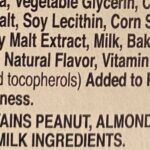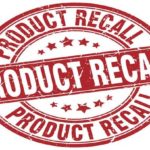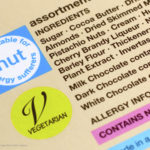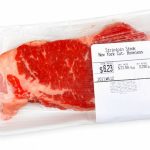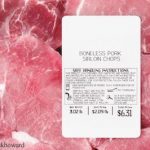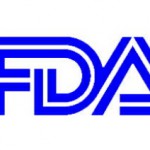The FDA has issued new guidance for food allergen labeling. This new document will answer questions about label requirements, and update information that was in earlier editions of this final document. The FDA is seeking comments on this new guidance. There are nine major food allergens, according to the government. If one of these ingredients is present in the food, it must be listed in the ingredient list on the label, and in a special allergen statement that is put on every package. Those nine allergens are milk, soy, wheat, eggs, finfish, shellfish, tree nuts, peanuts, and sesame seeds. Sesame was added when the FASTER Act was passed in April 2021. Those allergens were chosen based on how common the reactions to them are, and their severity. The draft guidance includes new … [Read more...]
Manufacturers Encouraged to List Sesame on Food Labels
There are eight major food allergens that must be listed on food labels according to the FDA: fish, milk, eggs, wheat, tree nuts, finfish, peanuts, and soy. But a substantial number of Americans are allergic to other foods and ingredients, including food dyes, mustard, and sesame. Now manufacturers are encouraged to list sesame on food labels by the FDA. Susan Mayne, Ph.D., director of the FDA's Center for Food Safety and Applied Nutrition said, "While most products containing sesame declare it as an ingredient, there are times when sesame is not required to be declared by name on the label, such as when it is used as a ‘flavor’ or ‘spice.’ Other ingredients, like ‘tahini,’ are made by grinding sesame into a paste, but not all consumers are aware that tahini is made from sesame. In … [Read more...]
What Do the FDA Relaxed Food Allergen Labels Mean For You?
In May 2020, the FDA relaxed food allergen label requirements during the coronavirus pandemic. They called this guidance "minor formulation changes," which were to "help minimize the impact of supply chain disruptions associated with the current COVID-19 pandemic on product availability." One of the changes was to let manufacturers use existing labels when making "minor formula adjustments" due to those disruptions. The guidance also applies to foods sold in vending machines. The guidance will remain in place as long as the public health emergency is in place. When the emergency is declared over, the FDA will "consider and publicly communicate regarding whether an extension, in whole or in part, is warranted, based on comments received to this guidance and our experience with its … [Read more...]
Cooking More at Home? Use the Nutrition Facts Label
With more people cooking at home since restaurants are closed for the coronavirus pandemic, the FDA is offering information about the nutrition facts label to help you learn more about the foods you buy. Many people haven't look at a nutrition label in a while, so it's good to be informed. There are several labels on foods. Those labels are important for several reasons. First of all, it's where the potential allergens that ma be in the food are listed. You'll also find the calorie count per serving: this is important, since many people don't realize how many servings is actually in each container of food. In the new nutrition facts label, the calorie count is displayed in larger, bolder font. Some serving sizes are updated to better reflect what people actually eat and drink. … [Read more...]
FDA Wants Info on Fiber on the Nutrition Facts Label
The FDA is providing more time for the public to comment on the fiber documents related to the Nutrition Facts Label. The label is being updated with new content, including serving size requirements based on what the reality of what people actually eat, and daily values for certain nutrients. The original comment period was going to close on January 9, 2017. The FDA is also going to provide more time to comment on its draft guidance "Scientific Evaluation of the Evidence on the Beneficial Physiological Effects of Isolates or Synthetic Non-digestible Carbohydrates Submitted as a Citizen Petition." The FDA's final rule that was published on May 27, 2016, required that only certain naturally occurring dietary fibers found in whole foods, and added isolated or synthetic fibers that … [Read more...]
Consumer Reports Decodes Labels on Meat Packages
Consumer Reports is helping consumers decode the labels on their meat packages. Information on the label can tell you if the meat is organic, if the animal was raised without synthetic hormones or antibiotics, if it was grass fed, and more. Here are some label terms and what they mean. "Grass fed" means that meat must come from an animal that has never been fed grain and can graze in a pasture during the grazing season. The animal can be fed antibiotics and hormones. "Partial grass-fed" as a label term is meaningless, since all cattle eat grass or hay when they are young. Grain is given to some of these animals so they get bigger before slaughter. The American Grassfed Association and Animal Welfare Approved Grassfed labels have stricter standards than the USDA. "Humanely raised" … [Read more...]
USDA Ends Country-of-Origin Labeling Enforcement
USDA is no longer going to enforce Country of Origin Labeling requirements (COOL) for beef and pork products because the law was repeated by Congress in the Omnibus Bill. Tom Vilsack, Agriculture Secretary, said that labeling regulations will be amended as soon as possible. The USA has been in a fight with the World Trade Organization for years over this issue. WTO ruled that Canada and Mexico, which opposed the labeling requirements, could impose more than $1 billion in tariffs on U.S. products as punishment for the "harm" the labels were causing producers in those countries. Many consumer groups and agricultural groups were in favor of COOL, believing that consumers have a right to know where the foods they buy come from. A Montana-based cattle trade association called R-CALF USA … [Read more...]
FDA Asks for Consumer Comments on Labeling Term “Natural”
The FDA is asking for consumer comments on the labeling term "natural". The agency has received three Citizen Petitions asking that that term be defined in food labeling, and one Citizen Petition asking that the FDA prohibit the term "natural" on food labels. Some federal courts have asked for administrative determinations from the FDA regarding whether some foods, specifically those with genetically engineered ingredients and those containing high fructose corn syrup, can be labeled "natural." The FDA states "it has not engaged in rule making to establish a formal definition for the term 'natural,' we do have a longstanding policy concerning the use of 'natural' in human food labeling." The term is considered to mean that nothing artificial or synthetic has been added or included in a … [Read more...]
COOL Damages Much Lower Than First Thought
The legal wrangling over country of origin labeling (COOL) took a new turn this week, when the U.S. Trade Representative (USTR) filed a brief in the World Trade Organization dispute over the issue. The brief states that the $3 billion sought by Mexico and Canada in retaliatory tariffs vastly overestimate damages. The brief recommends that the damage limits be set at $43.22 million for Canada and $47.55 million for Mexico. USTR says that the methods used by the two countries to estimate damage was flawed and "severely overestimates the level of nullification or impairment attributable" to COOL. Food & Water Watch's Wenonah Hauter said in a statement, "the WTO has never certified Canada and Mexico's absurdly high claims for damages from the COOL case and is only now considering … [Read more...]
Coalition Urges Senators to Reject Changes to COOL
A coalition of food safety and consumer advocates has written a letter to the Senate, urging legislators to "reject any effort to repeat, rescind or weaken country of origin labeling (COOL) in any federal spending legislation." The World Trade Organization (WTO) just ruled against the United States COOL system, saying it was punitive to other countries. Roger Johnson, President of the National Farmers Union said in a statement, "Congress needs to stay the court on COOL and leave it alone, especially now that the Obama administration has appealed the current decision to the WTO. COOL has been embraced by consumers who want to know where their food comes from and by family farmers who are proud to provide that information." COOL was first enacted in the 2002 and 2008 farm bills. A … [Read more...]
